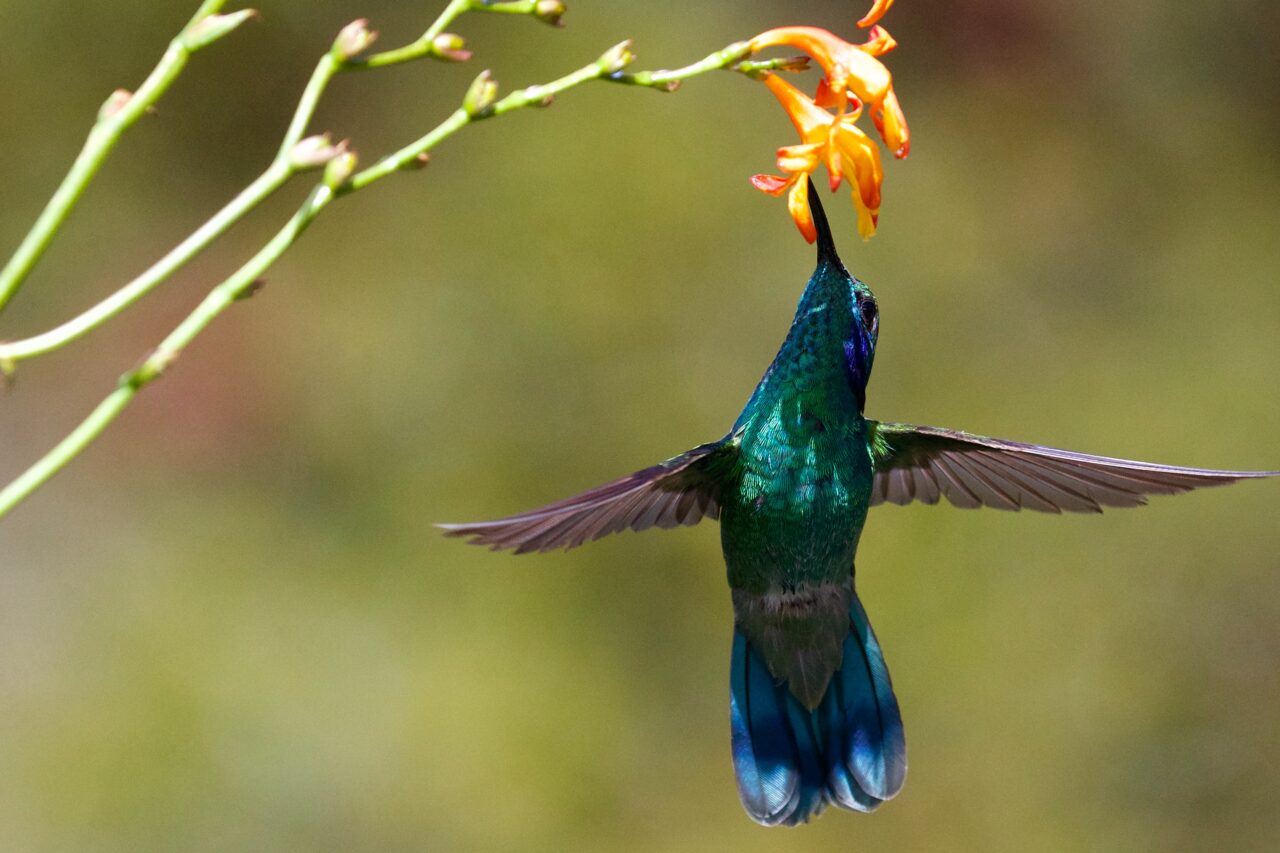All about Birds
What do Birds Eat: Attract More Birds With the Best Food
What do birds eat?
And what can’t they eat?
Discover the different types of bird diets and everything you need to know about what birds eat…
Types Of Bird Diets
Natural Foods
Natural foods are consumed by birds in their habitats. These foods organically exist in the environment.
As the base diet of birds, natural foods provide the nutrients that these animals need such as fat, carbohydrates, vitamins, minerals, and proteins.
Giving natural foods to birds is highly recommended for various reasons. One is that natural foods are easily recognizable by birds, and hence, will certainly be eaten.
Moreover, natural foods are a more practical option as you will not have to purchase seeds or refill feeders.
Seeds are excellent examples of natural bird food. Birds who consume seeds of flowers and trees are called granivores.
Birds can feed on seeds from flowers such as asters, cornflowers, blanket flowers, cosmos, dandelions, marigolds, sunflowers, poppies, and violets.

These animals can also feed on seeds from trees. The Morton Arboretum says the seeds of the Japanese tree lilac, maple, bald cypress, and American linden are appealing to birds.
Fruits of trees such as wild black cherry and amur cherry can also provide nourishment to birds.
Birds can also feed on the fruit and nectars of plants. Frugivores are birds that eat fruits while nectarivores pertain to those that consume plant nectar.
The National Audubon Society lists down purple cornflowers and sunflowers as among the best plants for birds. The same goes for milkweed, cardinal flower, and Trumpet honeysuckle.
Birds that eat small animals are called insectivores. Rodents, for one, are a familiar prey for birds.
While rats are certainly not welcome in your backyard; birds would gladly feast on them.
Mealworms are also consumed by birds like blue tits, Robins, and pied wagtails. But make sure to give only fresh mealworms. Dead and discolored ones can cause problems like salmonella poisoning.

Natural bird foods are found in the surroundings. You can provide an environment conducive to eating for birds by planting flowers and trees right in your backyard.
You should also consider minimizing the use of insecticides and fertilizers that can destroy birds’ natural food sources.
Supplemental foods
Feeding birds with natural foods is not always possible. This is particularly true for bird lovers who have limited space at home or live in heavily developed areas.
In some cases, extensive landscaping may prove to be costly.
This is where supplemental food sources can come in. Giving supplemental foods is an effective way to vary a bird’s diet.
You can give birds a boost in nutrition, giving them the nourishment needed to survive the changing weather conditions or adapt to migration.
Supplemental foods can help birds meet their ferocious feeding requirements. Birds are capable of consuming up to 10,000 calories.
Hence, providing them with supplemental foods can boost their nutritional intake.
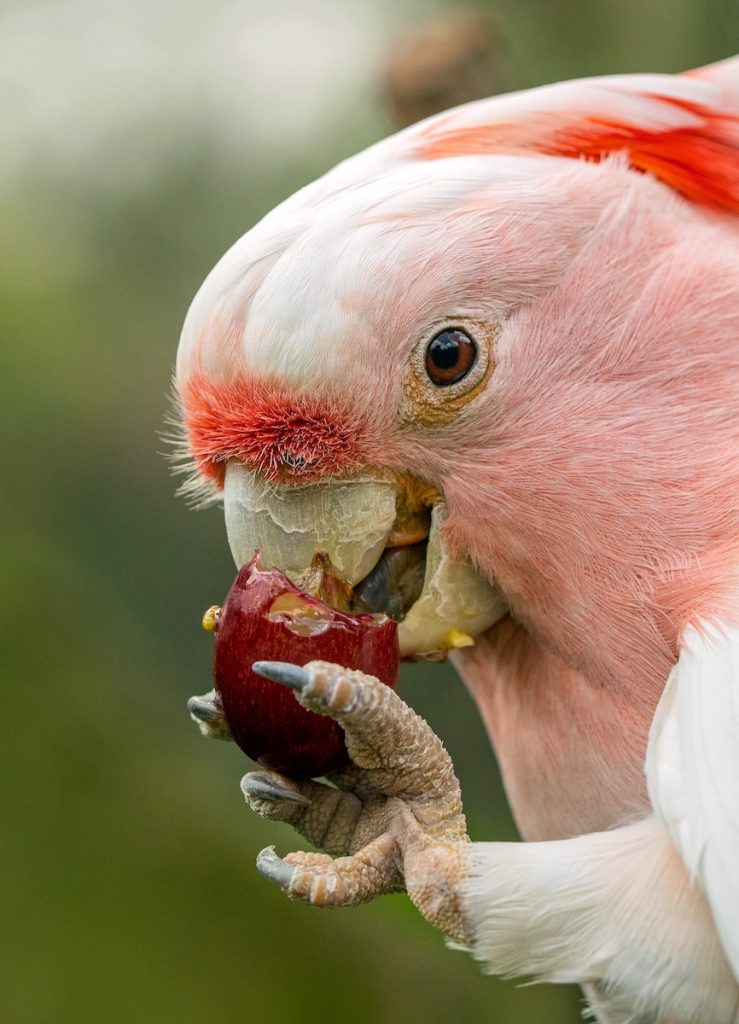
Some of the more popular supplemental foods for birds are cracked corn, black oil sunflower seeds, peanuts, mealworms, millet, jelly, nectar, mixed birdseed, nyjer, and safflower seeds.
These food supplements for birds can be found in the household.
Birds will also accept kitchen scraps like fruits, vegetables, cheese, and bread.
The use of a feeder is the most known way of providing supplemental food to birds. But you don’t need one to do so.
You can place the supplemental foods on a plate or simply sprinkle these on the ground.
Seasonal diets
Seasonal foods for birds are given during specific months of the year. These foods can provide birds the much-needed nourishment to thrive despite changes in the weather.
Seasonal foods keep birds healthy despite seasonal changes. These foods can provide them with energy and warmth during the winter.

In the summer, seasonal foods can provide protein for breeding and moulting. The latter pertains to the process of shedding old feathers with fresh plumage.
Seasonal foods vary. For summer, some of the best foods to give birds are sunflower hearts which are packed with energy and mealworms.
Other good sources of energy are apples, raisins, sultanas, and pears.
You may also give birds leftover food like pasta and rice. Cooked vegetables and unsalted meat are also recommended.
For winter, the ideal foods for birds are those rich in calories. These foods can give birds lots of energy to boost their fat reserves and survive cold winter nights.
One of the best winter foods for birds is a peanut. It is rich in fat and calories. It also appeals to many birds like chickadees, nuthatches, and jays.
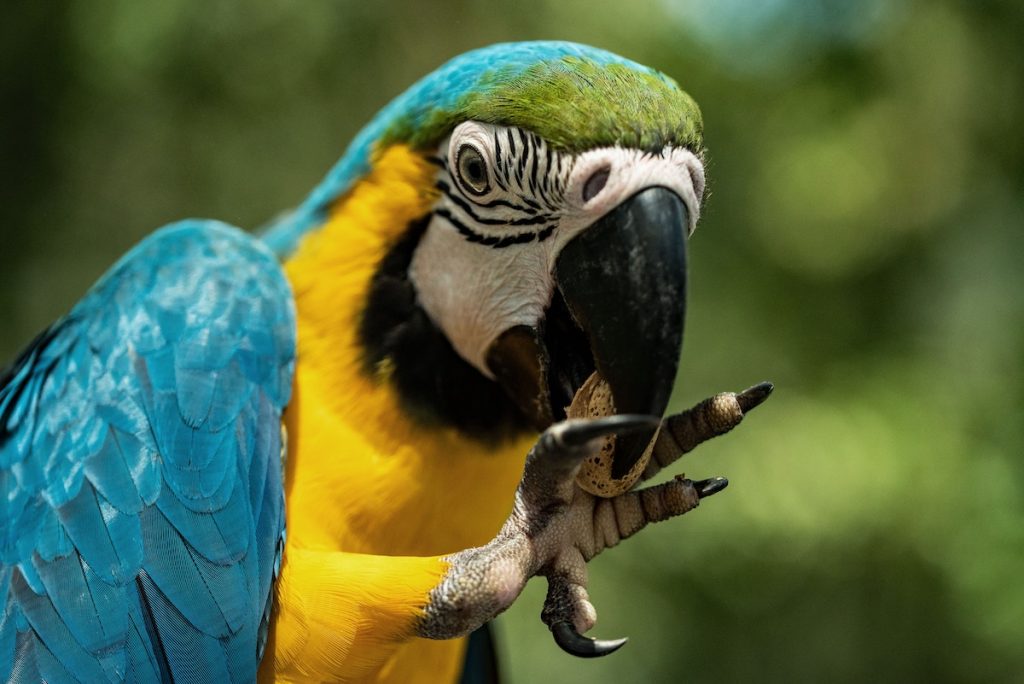
Peanuts won’t freeze, too, making them ideal for winter bird feeding.
Other foods that are excellent for winter feeding are millet, salt, seed mixes, and black oil sunflower seeds.
Seasonal foods for birds can come from various sources. Some foods like vegetables, rice, and pasta can originate from your kitchen. Others such as birdseed mixes can be bought from your favorite retailer.
You can use the feeder in offering seasonal foods to birds. You may also opt to leave treats like a peanut in small dishes or open trays.
See Also: The Ultimate Guide to Beautiful Birds
What Affects What A Bird Eats?
Season
Changes in the season not only affect the behavior of birds; it can also impact their diet. In the spring, summer, and fall, natural foods are abundant.
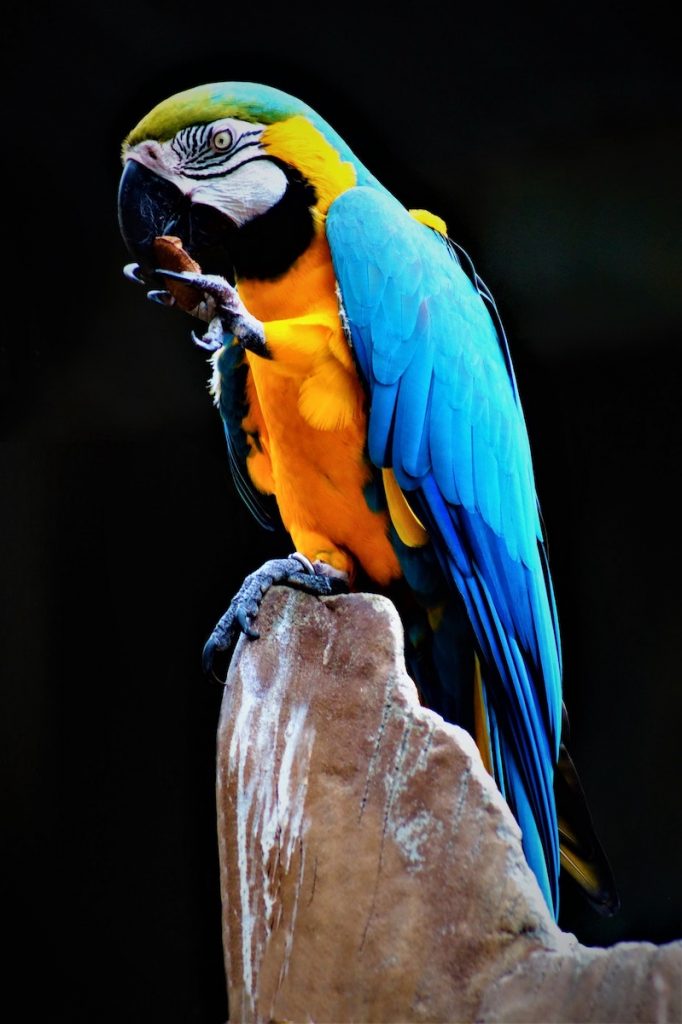
But during the winter, insects, fruits, nectars, seeds, and nuts are difficult to come by for birds.
Changes in weather can also lead to food shortages and even starvation.
In the summer, most birds rear their young that would then shed and grow new feathers.
Because they are busy tending to their chicks, birds are unable to stock up on food for the cold months.
Birds have different ways to cope with food shortages during the winter. Most of them migrate to warmer territories.
Small birds form flocks to increase the likelihood of finding food. Others scrounge for remaining seeds and fruits.
Nutritional needs
The nutritional needs of birds and humans are similar.
Like us humans, birds need carbohydrates, fats, proteins, vitamins, and minerals. Their nutritional requirements also affect their diet.

For example, omnivorous birds like red-winged blackbirds increase their intake of protein-rich animal foods during the breeding season.
Herbivorous birds, or those that primarily eat plant foods, can subsist on a low-protein diet during the year.
But they also eat as many animal foods like worms during the breeding season because of their need for protein.
Bird Species
There are numerous bird species in the world with varying diets.
Songbirds like blackbirds and finches belong to the so-called seed-eating bids. These birds rely on their wedge-shaped bills to crack and eat seeds.
Hummingbirds belong to the family of nectarivores, or birds who feed on nectar.

Acorn woodpecker, American dipper, and Brown Creeper are insectivorous birds. These birds feed on insects.
There are also large birds like eagles and hawks that prey on small animals like fish and other birds.
Waterfowl like ducks, meanwhile, feed on small aquatic creatures and plants.
See Also: Facts About Owls: 15 Fun & Mysterious Facts About Owls
Location
Birds migrate not only to escape the cold weather but also to find food sources.
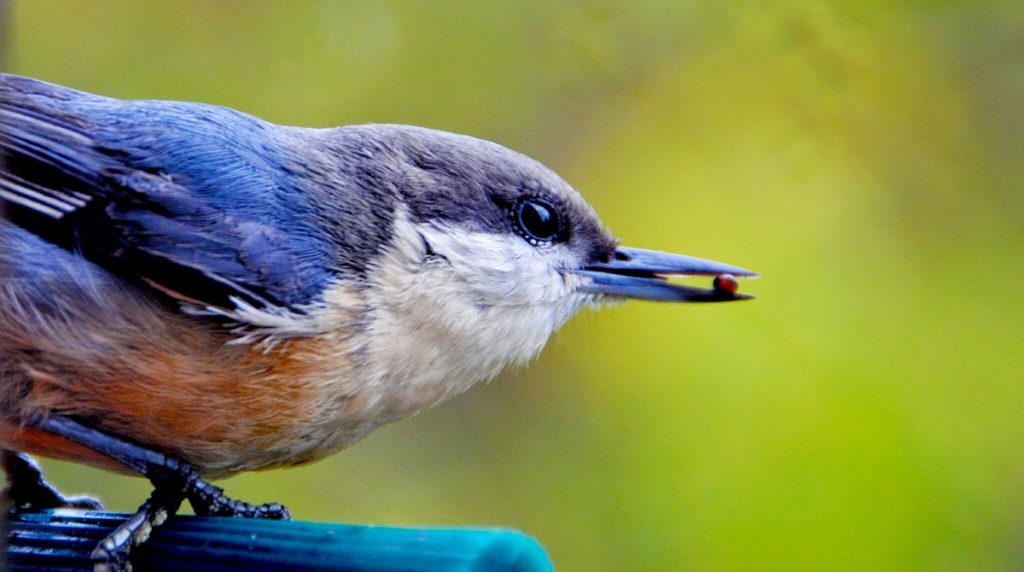
It is well-known that birds in the northern hemisphere migrate northward during the spring to prey on insect populations.
When winter arrives, birds move south in search of food sources.
Pet birds or indoor birds are generally seed and pellet eaters. But these foods are not enough to provide them with the nutrients their bodies need.
You may try giving your pet birds with fresh vegetables. Birds like the taste of vegetables such as broccoli, carrots, and asparagus.
Vegetables are also nutritious and can provide birds with vitamins and minerals. These are essential to the growth and immunity of birds.
Birds, though, can be picky with the appearance of vegetables. Thus, you may have to experiment with the preparation.
Try dicing, mashing, or chopping vegetables if the bird does not as the food sliced.
Other vegetables that you may give pet birds include beans, celery, peas, sprouts, peppers, and green leafy vegetables.
Fruits are also ideal foods for pet birds. Some of the fruits that you can try giving your bird are bananas, pineapples, oranges, berries, lemons, and apples.
Of course, you can give specially-formulated supplements to your pet birds.
These supplements can be procured from pet shops. However, it would be wise to seek the recommendation of your veterinarian first before buying a supplement for your pet bird.
Bird supplements can give your pet a boost, providing essential vitamins, minerals, and fatty acids.
You should remember, though, that supplements should not be considered a suitable replacement for a well-balanced bird diet.
What Do Wild Birds Eat?
In the wild, birds forage and hunt for food. Again, different bird species have varying food preferences.
For instance, woodpeckers eat bugs. Some species like the redheaded woodpecker hunt and store for nuts and acorns.

Perching birds eat differently. Hummingbirds feed on flower nectar and bugs.
The American Goldflinch eats seeds of sunflowers and echinacea. Omnivorous birds such as magpies and jays eat insects, seeds, fruits, and vegetables.
Swallows and pigeons fly most of the time. Swallows love to feed on insects and berries.
Pigeons, which are commonly taken care of by humans, subsist on fruits, seeds, and nuts.
Birds of prey such as eagles, hawks, and falcons hunt for small animals like rodents, lizards, fish, snakes, insects, and other birds.
See Also: Black Palm Cockatoo Bird: What You Need To Know
What Do Baby Birds Eat?
In terms of dietary needs, baby birds can be as voracious as their adult counterparts.

They may eat up to 14 hours a day depending on their species.
Their diet needs to be full of protein to ensure their growth.
In the wild, baby birds consume what their parents consume such as insects, seeds, and worms.
If you have found a baby bird, you can give food such as finely chopped corn and peas.
Small insects may also be appetizing to them. Even canned pet food may be given to small birds.
FAQs – The Short Answers About What Do Birds Eat:
Question 1: What do birds drink?
Like most animals, birds primarily drink water. But unlike other animals like mammals, birds need more water to stay hydrated and fuel their flight.

However, there are bird species that manage to get their water from foods such as fruit, insects, and nectars. These birds are often those that are away from water sources like ponds and rivers.
Question 2: What can birds not eat?
It may appear that birds can eat everything given to them. But the truth is that there are certain foods which should never be offered to birds because it can harm or even kill them.
According to PetMD, foods that are toxic to birds include avocado plant which contains a fatty acid-like compound called persin.
It can cause heart damage and even sudden death.
Caffeinated drinks such as tea and coffee are also dangerous to birds. Caffeine may boost the heart rate of birds, inducing cardiac arrest in the process.
Other foods that are toxic to birds are chocolates, onions, garlic, fruit pits, and apple seeds.
Remember these foods if you don’t want to hurt or even kill your pet bird.
Question 3: Which is the best food for birds’ raw or cooked food?

Generally speaking, bird foods should be served raw instead of cooked.
The digestive system of birds is best suited to consuming foods in their raw and natural state.
Cooking can also decrease some of the nutrients found in bird foods.
Question 4: What food is best for birds?
The answer really depends on the type of bird.

For example, the best food for nectarivores is nectar which provides them with energy.
On the other hand, insectivorous birds rely mostly on insects for their dietary needs.
Question 5: Do birds eat bread?
The short answer is yes, birds eat bread.

But a closer look at the composition of bread and you will realize that it is not a natural food for birds, and hence, is not suitable for bird consumption.
In terms of nutrition, bread does not offer anything to birds.
Think of it as the equivalent of chewing gums to humans.
It is an empty filler that won’t provide protein, fat, or carbohydrates to birds.

